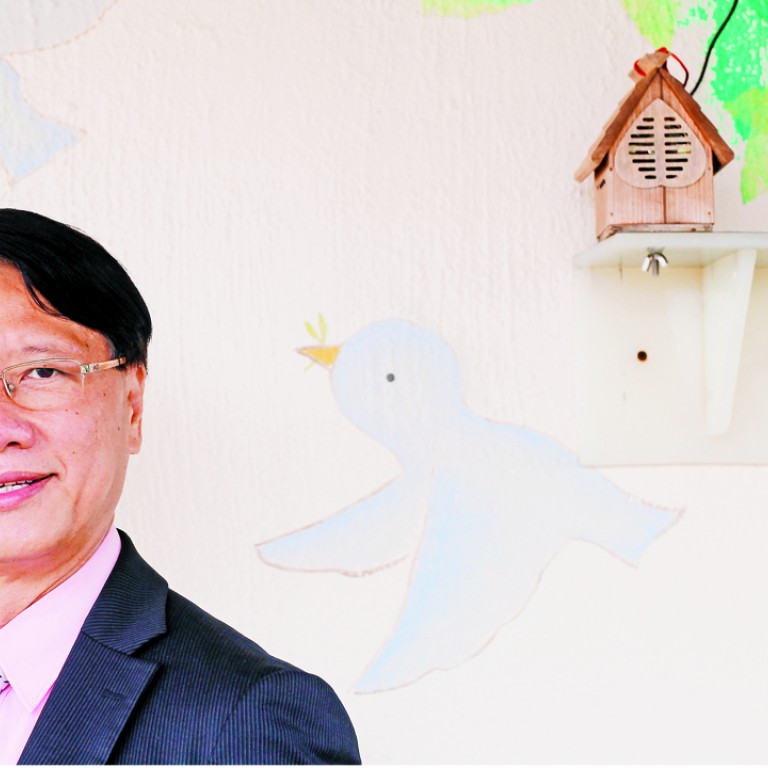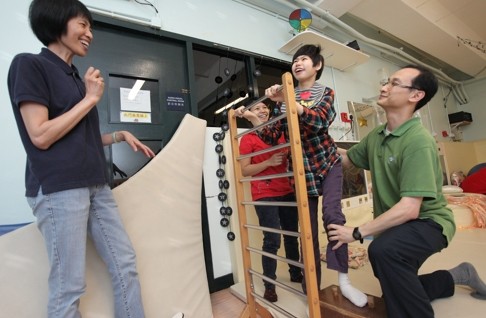
How Hongkonger whose son has rare genetic disorder helps others with special needs
Meet the dedicated dad and principal of a special needs school in Tseung Kwan O who is pulling out all the stops to give children with disabilities the opportunity to explore their potential
Shortly after his third son was born, Law Kai-hong faced the devastating possibility that his baby might never be able to walk normally. His son is one of only two Hongkongers born with Kabuki syndrome, a rare genetic disorder that causes varying degrees of skeletal and other abnormalities.
After the boy started walking at the age of two, Law lost sleep worrying that his son might be bullied at school because of his mild intellectual disability, weak muscles and slow development. The son is now 21 and has overcome his disability to win many swimming and rowing awards, but Law still worries what the future might hold for his youngest child.

“I’ve had to struggle and overcome many obstacles as my special needs child was growing up so it’s easy for me to empathise with students’ parents. That’s why I would pull out all the stops for my school,” says Law, who became the principal of Sunnyside in 1991.
But his dedication to special needs children began much earlier, when he was counselling a pupil at another school who still could not add or subtract in Primary Five.
“Neither the parents nor the school did anything to help the slow learner catch up with her studies and promoted her to the next grade despite her poor grasp of knowledge. That’s why I want to rectify the situation and help these marginalised students,” Law says.
His first six years at Sunnyside were far from comfortable: the school was forced to move in 1989 after the original location next to a quarry was declared unsafe.
It wasn’t until Natasha Wilson, wife of former governor David Wilson, paid them a surprise visit in 1992 that their plight came to wide attention. The publicity helped attract sufficient donations to fund a major overhaul of the premises in 1995.
Today the 50,000 sq ft facility serves a community of 88 day students and boarders, who receive occupational, speech and physiotherapy.
Law is particularly proud of their sensory garden, which is divided into separate zones for discovery, exercise and play, and features water curtains, tunnels and a greenhouse.
The place lets children with learning difficulties or visual impairment experience sensations that most people take for granted, in a controlled and safe way. It also provides stimuli to improve co-ordination and check problem behaviour.
Boosting its e-learning options, Sunnyside rolled out a mobile application last year with a library of visual vocabulary that gives mentally handicapped students an alternative way to express their emotions and learn new words about foods and places. Funded by parents and designed by a speech therapist, the free app helps special needs children extend their learning beyond the classroom, Law says.
The school also goes to considerable effort to engage with parents. Law welcomes parents’ input when ordering new buses, and invites them to sample revised menus at the canteen to see if meals are up to scratch.
More importantly, it is one of the few local facilities that opens its doors to family members on weekdays. Parents are free to take their children to the indoor heated hydrotherapy pool for training sessions to build up muscle strength and motor skills. They can also observe how speech therapists unlock their child’s communication potential bit by bit.
That is why although their classrooms were a hive of activity during our recent visit, with youngsters drawing on tablets or working out on a treadmill, a number of the adults cheering them on at the sidelines are parents or domestic helpers.
“This train-the-trainer concept allows students to extend their learning beyond regular teaching hours and receive quality care at home,” Law explains. “It also saves time having to organise workshops for parents.”

“Winning parents’ confidence means there will be less conflict. It also helps us implement new policies and courses that benefit students with greater ease and efficiency.”
Even so, parents face a major dilemma when youngsters with more serious disabilities eventually graduate from Sunnyside school. There are about 2,000 people in the queue to join the government’s adult rehabilitation centres, and waiting time can be as long as 12 years.
Although Law’s train-the-trainer approach helps prepare parents for this care vacuum, it remains a demanding and costly undertaking.
In some cases, Law says, parents are forced to send their grown-up children with severe intellectual disabilities to elderly homes; at poorly run facilities, a few parents have found that untrained care workers would keep their offspring tied to the bed all day except for meal times and toilet visits.
“Without appropriate and sufficient exercise for the mind and body, students’ condition could deteriorate so rapidly that they would lose all the skills they learned at school. In a few years’ time, some won’t even remember how to sit or stand.”
Such dire situations prompted Law to set up the Haven of Hope Sunnyside Enabling Centre, on the secondary school’s premises in 2006.
Run on a self-sustaining, non-profit basis, the centre provides a place where youngsters with severe disability can continue to receive therapy at a low cost until a vacancy opens up in a government facility. The centre houses 16 youngsters.

And with quality teaching and enduring support, he adds, they can surely flourish.
